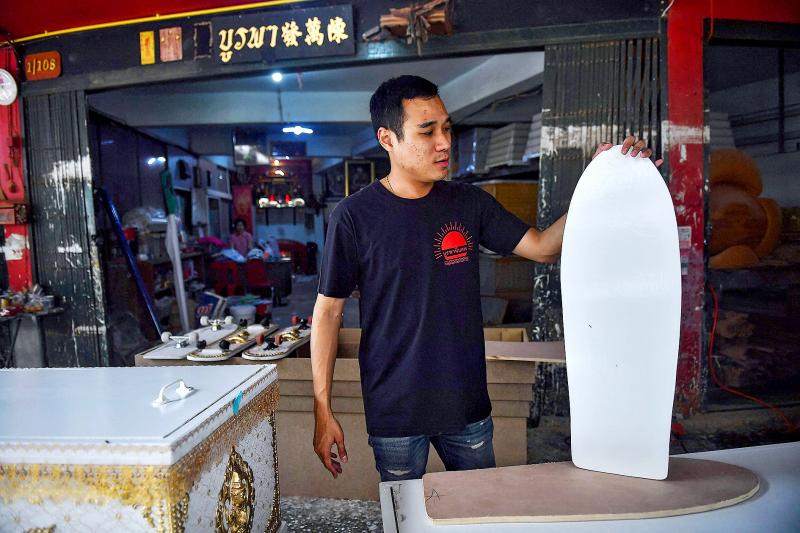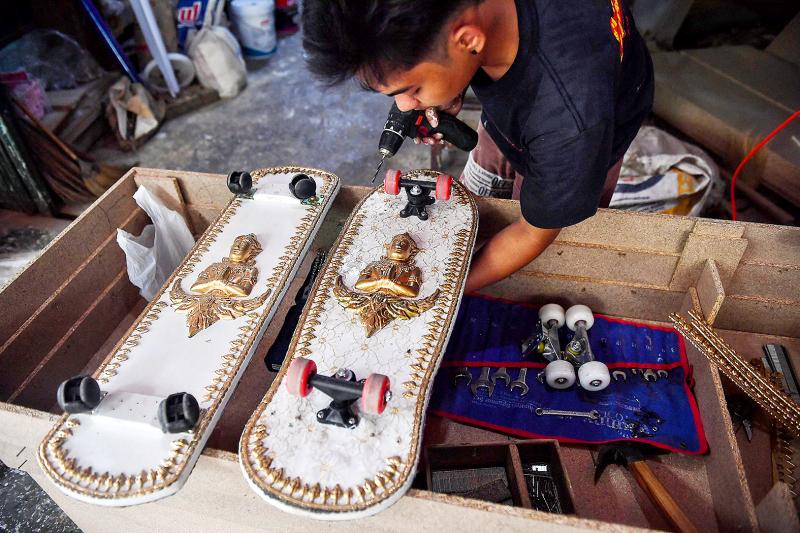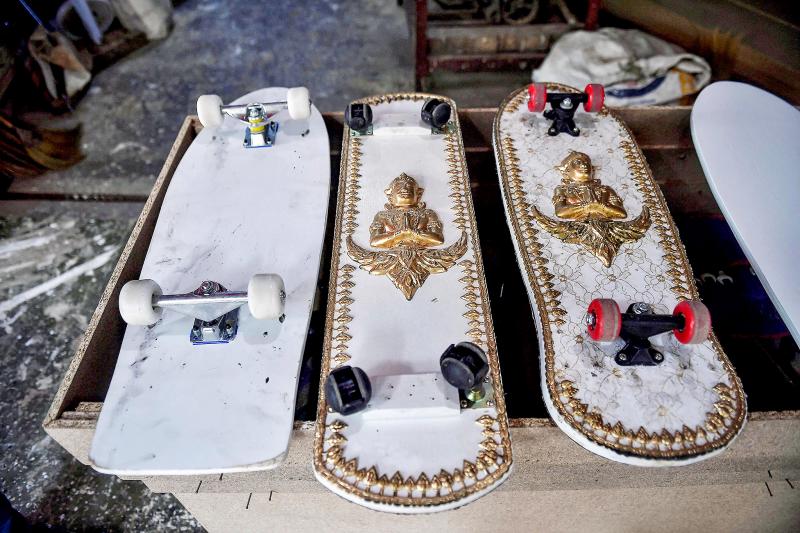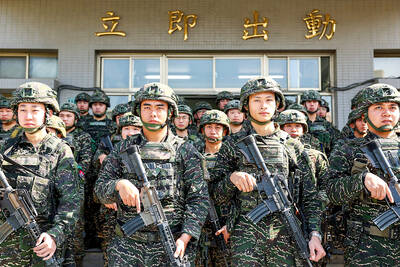From a final resting place for the dead to a gnarly way to land a trick; a Thai coffin-maker is affixing Buddhist emblems to the dismantled walls of his caskets, and transforming them into skateboards.
As the popularity of board sports exploded in Thailand, and the price of a skateboard skyrocketed, Anusorn Yungyearn decided to breathe new life into some of the wooden caskets he had lying around his Bangkok workshop.
“I want to give the kids who don’t really have much chance in life an opportunity to skate,” said the 30-year-old.

Photo: AFP
“I also don’t want them to ask their parents to buy one for them since the cost of it is really high.”
In the past year hordes of young Thais have taken up skateboarding and surf-skating — likely a consequence of most social spaces like bars and gyms being closed for months at a time because of pandemic restrictions.
Today, bands of young skaters can be seen cruising through Bangkok’s historic quarter and its universities’ open spaces.

Photo: AFP
Anusorn’s warehouse has coffins with brocade designs, golden lattice work and even holographic stick-ons. But for his boards, he has decided to keep it comparatively simple — gleaming white with golden trimming on the bottom.
“The procedure of making these boards is almost exactly like making the coffins,” he said, adding that he sticks a signature twist to the boards.
“We put the Thai angel emblem and the Thai traditional border on the board’s edge.” The first 10 he flips from coffins to skateboards will be donated to lower-income families — though he admitted getting them right will be tough.

Photo: AFP
“Some kids have never ever heard of a skateboard before so we want to make these casket skateboards as close to the real boards as possible.
“That way they could play and smile a little bit from all the fun.”

That US assistance was a model for Taiwan’s spectacular development success was early recognized by policymakers and analysts. In a report to the US Congress for the fiscal year 1962, former President John F. Kennedy noted Taiwan’s “rapid economic growth,” was “producing a substantial net gain in living.” Kennedy had a stake in Taiwan’s achievements and the US’ official development assistance (ODA) in general: In September 1961, his entreaty to make the 1960s a “decade of development,” and an accompanying proposal for dedicated legislation to this end, had been formalized by congressional passage of the Foreign Assistance Act. Two

President William Lai’s (賴清德) March 13 national security speech marked a turning point. He signaled that the government was finally getting serious about a whole-of-society approach to defending the nation. The presidential office summarized his speech succinctly: “President Lai introduced 17 major strategies to respond to five major national security and united front threats Taiwan now faces: China’s threat to national sovereignty, its threats from infiltration and espionage activities targeting Taiwan’s military, its threats aimed at obscuring the national identity of the people of Taiwan, its threats from united front infiltration into Taiwanese society through cross-strait exchanges, and its threats from

Despite the intense sunshine, we were hardly breaking a sweat as we cruised along the flat, dedicated bike lane, well protected from the heat by a canopy of trees. The electric assist on the bikes likely made a difference, too. Far removed from the bustle and noise of the Taichung traffic, we admired the serene rural scenery, making our way over rivers, alongside rice paddies and through pear orchards. Our route for the day covered two bike paths that connect in Fengyuan District (豐原) and are best done together. The Hou-Feng Bike Path (后豐鐵馬道) runs southward from Houli District (后里) while the

March 31 to April 6 On May 13, 1950, National Taiwan University Hospital otolaryngologist Su You-peng (蘇友鵬) was summoned to the director’s office. He thought someone had complained about him practicing the violin at night, but when he entered the room, he knew something was terribly wrong. He saw several burly men who appeared to be government secret agents, and three other resident doctors: internist Hsu Chiang (許強), dermatologist Hu Pao-chen (胡寶珍) and ophthalmologist Hu Hsin-lin (胡鑫麟). They were handcuffed, herded onto two jeeps and taken to the Secrecy Bureau (保密局) for questioning. Su was still in his doctor’s robes at